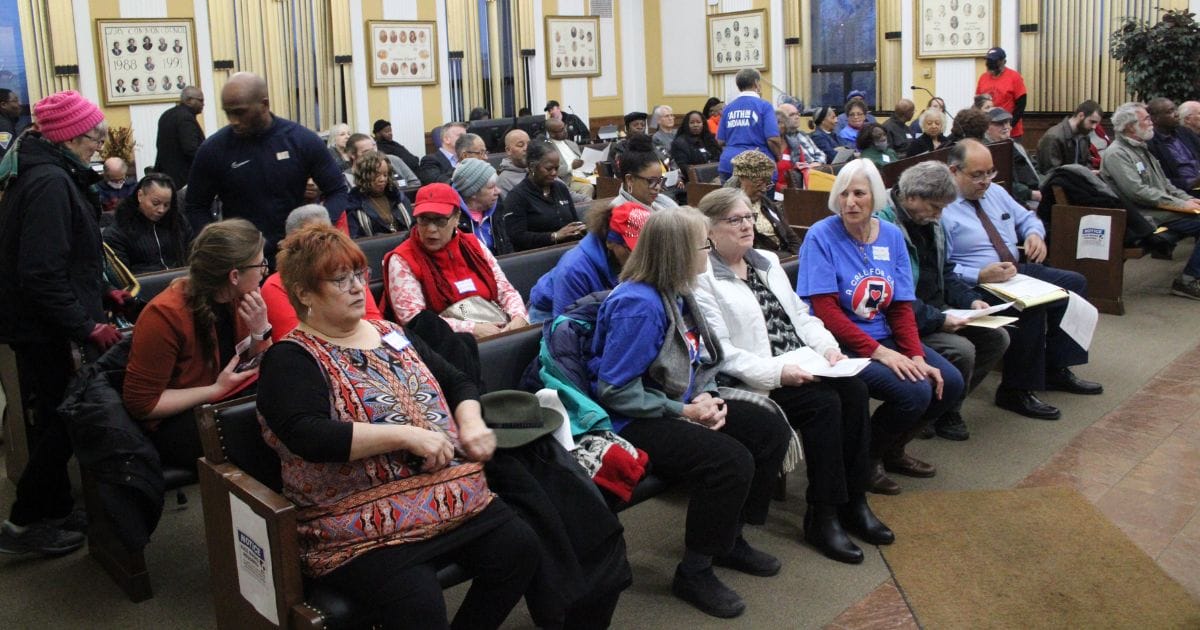Photo caption: AFTER PRAYING ON the steps of Gary City Hall, a large number of people from Gary’s Faith Community led by the Interfaith Action Network filled the Gary Common Council seating area to witness the final vote on the Appropriations Ordinance. The Ordinance will kick-start the Mobile Crisis Response. It passed unanimously on Tuesday, March 7, 2023
Priority to take law enforcement out of responses to mental health crises
On Tuesday, March 7, 2023, the Gary Common Council unanimously voted to provide funding for a Mobile Crisis Response program, setting the city on a path to become the first in northwest Indiana to do so. Tuesday night’s vote was an approval to appropriate $1.5 million of American Rescue Plan Act funds to initiate the program in Gary.
The vote came after supporters among the standing room only crowd spoke to the council about the urgent need for the program and the benefits it will provide for Gary residents.
The program is spearheaded by the Interfaith Action Network (IAN), a coalition of multi-racial and multi-denominational churches and synagogues in Lake and Porter County that came together in 2020 after the events around the murder of George Floyd.
Before the council meeting started, the Interfaith Action Network held a prayer vigil on the stairs of the Gary City Hall.
Reducing police responses to mental health crises is one of the program’s highest priorities.
“I don’t want my story to be their story,” said Marcella DeLavallade-Amos, a supporter. “I wonder if my son would still be alive if trained mental health professionals had responded to my call for help instead of law enforcement.”
Elaine Spicer is an IAN member and a member of the city’s Police Reform Commission. “When Mayor Jerome Prince took office in 2020, even before the ARPA money was available, we asked for a mobile mental health crisis program. We are thrilled the money is available,” Spicer said.
For Lake County Prosecutor Bernard Carter, the program will help prevent police involvement.
“One of my main jobs is to review a police-involved shooting, to determine if it was justified or preventable, whether or not it was mental illness. The ones that I ruled as justifiable were also preventable,” Carter said. “We need trained mental health professionals to assist the police and police to assist them. We need to prevent lives from being taken away from us.”
“A mobile health unit would benefit people with other types of disabilities, like autism and cognitive disabilities and the people who don’t know how to interact with them,” said Teresa Torres of Everybody Counts, a disability rights advocacy organization.
The program will be city-wide, available 24/7 with no refusal of services and a pledge to use housing facilities, if needed, other than the county jail. Mobile Crisis Response will incorporate trained social workers and mental health clinicians into crisis situations that in the past have been handled primarily by law enforcement dispatched through 911.
IAN’s Becky Hanscom said, “In 2022, Indiana ranked 43rd out of all states (plus the District of Columbia) in the highest prevalence of adult mental illness and the lowest rate of access to care; only eight states were worse. Numbers cannot begin to describe the trauma experienced by families, juveniles, seniors, veterans, disabled citizens, the homeless and all segments of our community.”
The IAN Fact Sheet uses a statement from the 2022 Indiana Supreme Court: According to Indiana Chief Justice Loretta Rush, “up to 80 percent of our current jail populations have mental illness, substance abuse, or co-occurring disorders.
“Serious mental illness is four-to-six times more prevalent in jail than in the general population. Police officers are not social workers, and jails are not treatment centers. And when we ask them to be, we compromise their core function of preserving public safety, which, in turn, puts everyone at risk.”
The Indiana State Senate unanimously passed legislation [SB 1] which would provide for a statewide infrastructure for mental health services, including Mobile Crisis Response. The House will debate funding of this bill in coming weeks.






